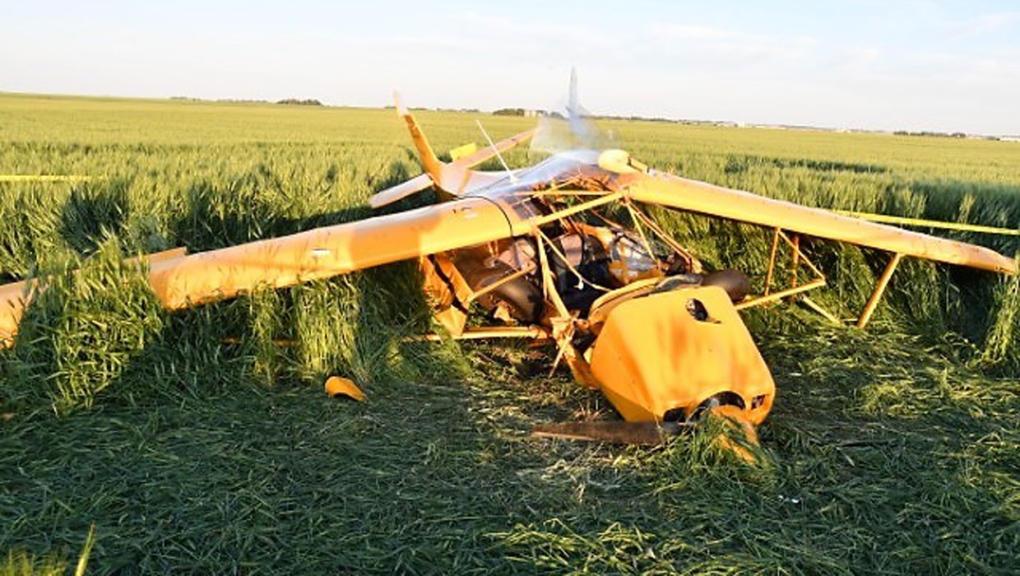Low-altitude manoeuvre led to fatal plane crash near Didsbury, Alta., TSB says
 Two people died after an ultra-light plane crashed into a field east of Didsbury, Alta., on July 13, 2022. (Supplied)
Two people died after an ultra-light plane crashed into a field east of Didsbury, Alta., on July 13, 2022. (Supplied)
A manoeuvre that was conducted too close to the ground is to blame for the deaths of two people in a small plane crash last summer, a report has found.
The Transportation Safety Board of Canada (TSB) was called to investigate a fatal plane crash in Mountain View County on July 13, 2022.
Two people, a 69-year-old man from Didsbury and a 65-year-old man from New Zealand, were killed in the incident.
In a full report released Wednesday, the TSB said the crash was a result of a power-on stall exercise that was conducted too close to the ground.
According to the investigation, the small private plane took off for a "local recreation flight" just east of Didsbury at approximately 9:55 a.m.
A short time into the flight, the TSB said the pilot entered "an intentional power-on stall at 1,100 feet above ground level."
The recovery from that stall was successful, but the pilot executed another power-on stall, this time at 900 feet above ground level.
During this manoeuvre, the TSB says the plane went into a spin and the pilot did not regain control.
"The aircraft's average descent rate was approximately 3300 fpm and the rate of rotation during the spin was approximately 90 degrees per second. The aircraft’s attitude near the end of the spinning manoeuvre was relatively flat compared to the typical nose-down attitude for light aircraft in a spin (which is normally fairly steep)," the TSB said in its report.
The aircraft crashed at approximately 10:14 a.m. Both occupants suffered fatal injuries.
The TSB, which says the investigation was launched for the purpose of transportation safety, indicates that Transport Canada has clear rules on these types of manoeuvres.
"Transport Canada indicates that stall recovery should be completed 'at an operationally safe altitude that allows recovery at or above 2000 feet AGL or the minimum height recommended by the manufacturer, whichever is higher,'" the TSB wrote.
Intentional spins of aircraft are also prohibited, it added, and stalls should not be attempted while there are passengers on board.
CTVNews.ca Top Stories

Common heart conditions raise the risk of dementia, experts say
If you are one of the millions with heart disease, you have a higher risk for future dementia, according to the American Heart Association.
'He told me he fell in love with me': Canadian senior loses $20K to romance scam
Two sisters from Ontario travelled to Newfoundland to spend time with their mom after they learned she lost $20,000 to a romance scam.
Trudeau tells premiers to start cutting pharmacare deals as soon as possible
Prime Minister Justin Trudeau is calling on provinces and territories to start negotiating pharmacare deals as soon as possible, now that the federal legislation to enact the program has become law.
opinion What are the best ways to boost your income in Canada?
Whether you're looking to pay off debt, save for a big purchase, or simply give yourself greater financial stability, personal finance contributor Christopher Liew shares some of the best ways to boost your income.
Look up: Northern lights could be visible across Canada this week
The northern lights could be visible across most of Canada this week.
Al Pacino says being a new dad at 84 is a 'mini miracle'
Al Pacino is enjoying being a late-in-life dad. The legendary actor talked about being a father to a brood, including to 16-month-old Roman with producer Noor Alfallah.
Obama urges Black men to show up for Harris as he campaigns in critical Pennsylvania
Former U.S. President Barack Obama gave a blistering critique of his White House successor Donald Trump and urged Black men to show up for Kamala Harris as he campaigned in Pittsburgh.
Residents repair their homes and clean up after Hurricane Milton tore through Florida
Florida residents repaired damage from Hurricane Milton and cleaned up debris Friday after the storm smashed through coastal communities and tore homes to pieces, flooded streets and spawned a barrage of deadly tornadoes.
Economy adds 47,000 jobs in September, unemployment rate falls to 6.5 per cent
The economy added 47,000 jobs in September, while the unemployment rate declined for the first time since January to 6.5 per cent.

































